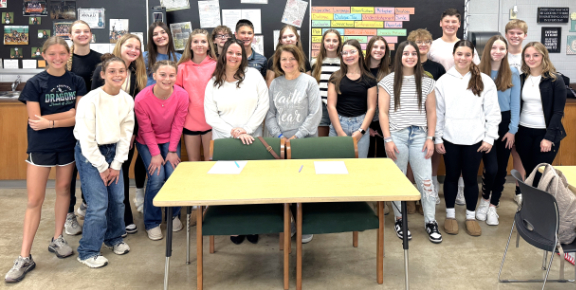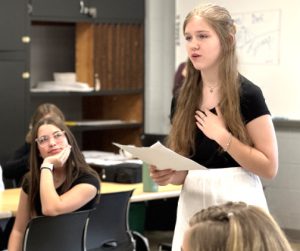STE. GENEVIEVE – School children have chanted this rhyme for decades:
“Lizzie Borden took an ax
And gave her mother forty whacks,
And when she saw what she had done,
She gave her father forty-one.”
It is likely that few of the school children chanting the skipping-rope rhyme, over the century and a quarter since the event were aware that the 32-year-old Lizzie Borden was actually acquitted of the crime.
Fast forward to 2025 and travel several hundred miles west of the Fall River, Massachusetts scene of the crime and you will find the case being tried again – this time in a classroom at Ste. Genevieve Middle School.
The students in Carla Basler’s eighth-grade Advanced English Language Arts class stepped into the shoes of lawyers to analyze one of America’s most famous murder trials.

Through a carefully designed competency-based learning (CBL) project, students reviewed the historical evidence and constructed their own legal arguments, simulating a courtroom trial. Divided into prosecution and defense teams, students developed opening and closing statements with the goal of persuading a jury with their argument.

The courtroom atmosphere came alive as students listened intently, applauded their classmates’ legal teams, and delivered their statements with confidence and emotion—showcasing not just their understanding of the material, but their genuine enthusiasm for the experience.
Competency-based learning empowers students to demonstrate mastery of specific skills and knowledge through real-world applications rather than relying solely on traditional tests. In this project, students were assessed using a detailed rubric that evaluated their ability to organize arguments, integrate and explain evidence, address counter-arguments, and apply persuasive literary and rhetorical devices.

The experience was elevated through a guest visit from Donna Donze and Kyla Palmer of the Lance Drury Law Firm, who discussed with students concepts such as perjury, attorney-client privilege, and courtroom strategy. They emphasized how well-crafted opening and closing remarks can be pivotal in swaying a jury.
Ultimately, the 21st century students agreed with the 19th century trial outcome: with a strong mix of compelling claims and spirited arguments on both sides, the jury declared Lizzie Borden not guilty, citing insufficient hard evidence.
Mrs. Basler shared that the project exemplified the power of CBL to deepen learning. “My students weren’t just reading about history—they were using critical thinking, collaboration, and communication to take a stand and support it with evidence,” she said. “It was incredible to see them take ownership of their learning in such an engaging way.”
By exploring this mysterious case through the lens of legal analysis and literary composition, students gained valuable experience in public speaking, argument construction, and evidence-based reasoning—skills that will serve them far beyond the classroom.
